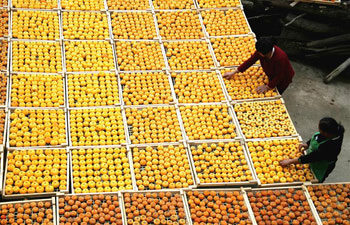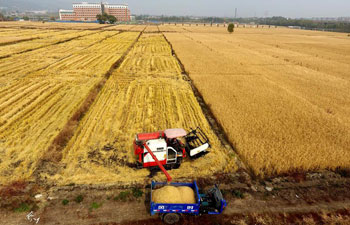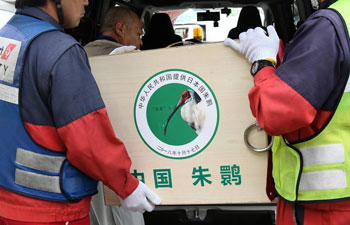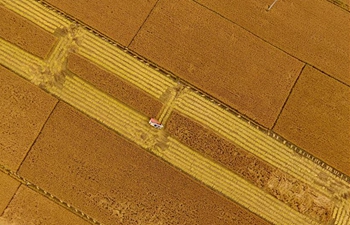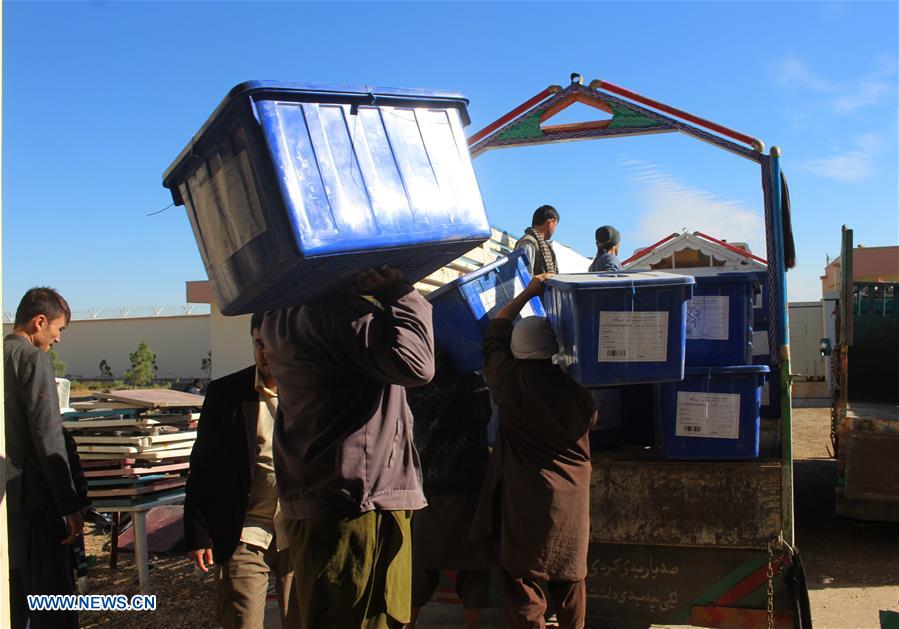 ?
?
Afghan Independent Election Commission (IEC) workers load plastic boxes of election materials from a warehouse to a truck in Mazar-i-Sharif, capital of Balkh province, northern Afghanistan, Oct. 17, 2018. More than 2,500 candidates will contest the 249 seats in the Wolesi Jirga or the lower house of parliament, however there is much to be done ahead of the poll expected to be attended by millions of voters on Oct. 20. (Xinhua/Yaqoub Azorda)
by Farid Behbud
KABUL, Oct. 17 (Xinhua) -- With claims of widespread fraud and growing insecurity and violence, campaigning for Afghanistan's long-delayed parliamentary election kicked off late last month.
More than 2,500 candidates will contest the 249 seats in the Wolesi Jirga or the lower house of parliament, however there is much to be done ahead of the poll expected to be attended by millions of voters on Oct. 20.
Most of the current Afghan lawmakers who are being widely blamed for corruption or their ineffectiveness are also among the hopefuls seeking re-election.
In addition, a number of political faces, hundreds of former warlords' descendants, entrepreneurs, as well as journalists, have emerged to contest the election.
Female candidates running in the election race and campaigning for women's rights, believe that former female-lawmakers have done nothing to push forward female empowerment. The candidates have vowed to fight hard for the rights of women in Afghanistan.
"Parliament, instead of being the house of the people, has turned into a network of bandits, hub of corruption and a place for those forwarding their own interests," TV presenter Maryam Sama, who vowed to establish a special rights committee for women if elected, told Xinhua.
The 26-year-old journalist who is running in Kabul province said she had very limited funds to support her campaign, but didn't believe that money can determine one's fate.
She said insecurity remains a major challenge for young campaigners across the country, adding that launching a house-to-house and street by street electoral campaign to draw voters' attention was an easy way to win the hearts and minds of voters.
On Saturday, a bomb blast rocked an election campaign of female candidate Nazifa Big Yusufi in the Rustaq district of the northern Takhar province, killing 22 people and injuring 36 others.
Yusufi, however, escaped the explosion. A total of 10 parliamentary contenders have lost their lives mainly in terrorist attacks since the candidates nomination period in May.
"Female lawmakers' beliefs about women's rights have paid into a patriarchal ideology here. They even failed to pass the law on the prevention of violence against women amid decades of misogyny that has seen many women confirmed to their homes," said Sama, who is committed to revising, amending and passing the law if she becomes a member of the legislative force.
According to Afghan laws, 68 out of 249 seats are allocated to women.
Another independent candidate, Zuhra Naurozi, who is also running in Kabul, said she had no financial backer and used her own savings from 12 years working as a media activist.
"I want to run in this election as the ground is now constitutionally paved for everyone to vote or be elected," said Naurozi, promising to establish a reform committee to counter laws being passed that are not in the Afghan citizens' best interest.
The failure of former representatives to meet the people's requirements has intensely disappointed ordinary Afghan citizens who are now openly raising their voices and even using abusive language against them.
"I will vote for a young determined Afghan. A youthful representative who will work for peace and security and serve the country and the nation. The older politicians have done nothing for the country," said Khalifa Pir Mohammad, a Kabul resident and citizen of Mazar-i-Sharif, a northern city of Afghanistan.
"I hope the votes of the people of Afghanistan will not be stolen again like in past elections," he said.
The hope for credible election results is seriously threatened by strong allegations there will be widespread rigging during the voting process and the availability of only 4,400 biometric devices.
It is far less than the 22,000 German-made machines used for voters' verification and the sudden lack of available machines is feared to derail the process, sources close to the matter said.
Earlier, district council elections, a process also scheduled to be held on Oct. 20, have been postponed, while the parliamentary vote was canceled in Ghazni province, after the provincial capital was raided by Taliban militants recently.
During the upcoming polls, nearly 9 million registered voters, including 3 million women out of some 12 million eligible Afghans, will cast their ballots to elect members of the lower house for a five-year term.

